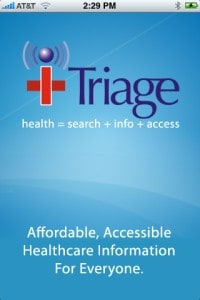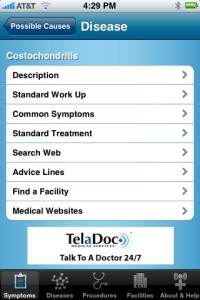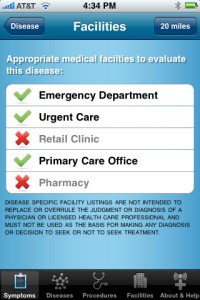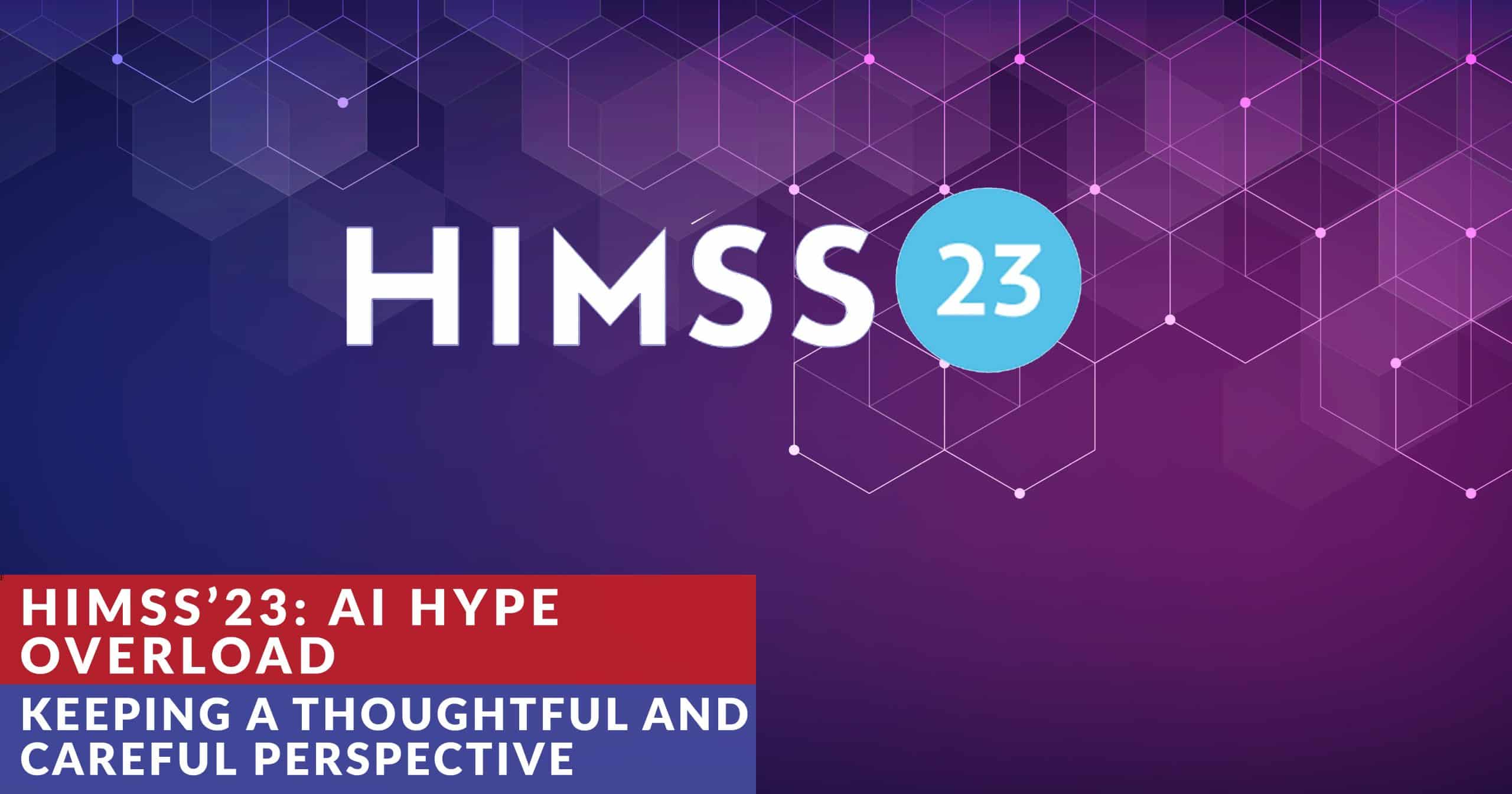 Couple of weeks back had the opportunity to talk to the CEO and CMO of Healthagen, developers of the iPhone app, iTriage a new, consumer-facing app with some interesting twists, including partnerships with Coalition America, HealthGrades and TelaDoc. iTriage can be found on the Apple iTunes store for less than a dollar.
Couple of weeks back had the opportunity to talk to the CEO and CMO of Healthagen, developers of the iPhone app, iTriage a new, consumer-facing app with some interesting twists, including partnerships with Coalition America, HealthGrades and TelaDoc. iTriage can be found on the Apple iTunes store for less than a dollar.
The co-creators of iTriage, who happen to be ER docs, developed the app to address a very real issue they saw everyday in their day jobs: The huge information gap that consumers have in choosing what level of care is appropriate for a given symptom. In developing iTriage, they wanted to marry “symptomitology” with diagnosis and from there recommended best care procedures/treatment plans and who is most appropriate to conduct those procedures for that given diagnosis.
How it works:
iTriage always launches with the question: Is this an emergency? If one answers yes, app automatically calls 911.
Once one gets past the “emergency question,” iTriage presents a very long list of symptoms alphabetically with search bar at top. Search on say chest pain, viola, there it is.
 After clicking on given symptom (we’ll use chest pain) one is provided an extensive list of possible causes (33 popped up for chest pain) which are often highly technical terms e.g., costochondritis, hiatal hernia, etc. and some more basic terms such as lung cancer. Within “Possible Causes” iTriage does offer a filter to limit selection to common, pediatric and life threatening causes.
After clicking on given symptom (we’ll use chest pain) one is provided an extensive list of possible causes (33 popped up for chest pain) which are often highly technical terms e.g., costochondritis, hiatal hernia, etc. and some more basic terms such as lung cancer. Within “Possible Causes” iTriage does offer a filter to limit selection to common, pediatric and life threatening causes.
Click on a Possible Cause and you are provided a number of fields to further drill down and understand the disease including standard work-up and treatment which may prove very useful in a clinical encounter. Standard work-up and treatment guidance is based on best practices (the developers of iTriage set-up a review board to oversee and approve work-up & treatment write-ups found in the app).
To some extent, much of the above can be found in other iPhone apps such as A.D.A.M., SymptomMD and WebMD, though none of those apps do it as extensively and comprehensively as iTriage.
 But where iTriage really gets interesting is assisting the user in the next step, where do I go to get treatment. Once one goes through the above self-triage steps, you can click to “Advice Line” which takes you to an embedded TelaDoc page where one can initiate a call to TelaDoc to get fee for service advice on your symptom(s)/condition.
But where iTriage really gets interesting is assisting the user in the next step, where do I go to get treatment. Once one goes through the above self-triage steps, you can click to “Advice Line” which takes you to an embedded TelaDoc page where one can initiate a call to TelaDoc to get fee for service advice on your symptom(s)/condition.
In addition to geting advice, one can also click “Find a Facility” and based on the disease you have self-identified, iTriage suggests which facility is most appropriate (see figure) and then leveraging the GPS capabilities of the iPhone locates the facilities within a given radius and provides directions from current location to the one chosen. Currently, iTriage has over 67,000 facilities listed within its proprietary directory. iTriage also has established a partnership with physician/hospital rating service, HealthGrades allowing the user to access information (like TelaDoc, for a fee) on specific facilities listed.
Nice features, especially for someone who travels as frequently as I do.
The Business Model:
Certainly the company will make some money selling the app, but at $0.99, they’ll need to sell a lot. They’ll also have some revenue sharing with their partners Coalition America, TelaDoc and HealthGrades. But what they are really banking on is listing services, much like the Yellow Pages, but in this case listing healthcare provider services, probably geo-located, within the app. Company emphatically stated that they will not rely on referral fees.
The Good, Innovative Aspects of iTriage:
1) Comprehensive list of symptoms and diseases with vetted work-ups and treatment options.
2) Unlike most iPhone apps, which are siloed. iTriage founders have done a mash-up of sorts leveraging partners to create a richer, more complete experience and of course, service.
3) Puts a lot of power into the hands of the consumer.
4) Low cost to end user to promote adoption, this could easily get viral.
5) Full HIPAA compliance to appease the privacy and security community.
And the Not So Good, Needs Improvement Category:
1) Interface is challenging and does not appear to be designed with the average consumer in mind. Far too many of the diseases listed for a given symptom are in obscure medical terminology that is difficult to decipher. This may be fine once a medical professional has confirmed a diagnosis and one wishes to know standard work-up and treatment, but as an entry point into self-triage, not so sure this is the best approach. The filter feature helps to simplify searching on diseases, but while his may shoprten the list, there remains the technical jargon. More graphical capabilities are needed – A.D.A.M. & WebMD have done a good job here that iTriage would be wise to emulate.
2) iTraige would also benefit from a built-in Natural Language Processor (NLP) allowing a consumer to enter common terms to search for a disease rather than a very long pick list.
3) Invoking the services of partners, particularly HealthGrades and medical bill negotiation service Coalition America is less than ideal. Right now, it is basically a punch-out to the Home Pages of these partners’ websites.
The Wrap:
A lot of utility in a small, cheap app that one can have with them wherever they go and tons of promise for the future as they expand partnerships and functionality to include such things as average costs of procedures, medication checking, etc. In its current form, it is certainly a good app to have when traveling, and if having fallen ill with no idea where to turn – iTriage can be a great resource.
But this app, in its current version, requires a sophisticated user and takes some practice (too much in our book) to navigate effectively. The developers have many plans in store for the app and will be releasing at least two more updates prior to Apple’s launch of the new iPhone OS 3.0, which is expected this summer. Let’s hope those versions focus on usability, the GUI and better embedding of partner services, rather than adding anymore features of which they have plenty for now.
ADDENDUM:
Just as we were geting ready to publish this, came across a presss release from Healthagen sent out today, 4/16/2009 announcing that iTriage will now have a cost estimator to assist the user in identifying potential cost of care. Another nice feature Healthagen, but please, let’s get that interface cleaned-up.




Concept seems sound, and system certainly logical if downstream pieces all work as planned and no GPS snafu’s, and ED means “emergency department” and not “erectile dysfunction”.
One potential weakness in design is reliance on user to properly rule out emergent conditions. In the extreme, for some a hang nail is an emergency. Not likely to be a large chunk of demographic using app; though my gut response to program logic.
Bottom-line, I think the app has major promise and makes a lot of sense. As long as algorithms, and triage protocols are best in class and updated regularly, and user education is part of plan.